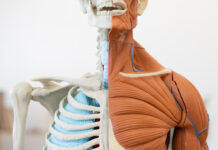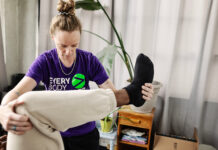
Most of us have experienced tweaks, cramping, mild strains or catching of joints as our training progresses or when we are deep into a race. For the most part, we ignore these twinges and push through to our goals. But should we?
When left alone, these seemingly innocuous twinges that come out of nowhere can escalate into major problems that can take you out of the game. Pain, put simply, is a warning signal to your brain that something is not quite right in the body. In this case, there is a loss of the physical homeostasis. What has happened in the body that has put it out of balance?
Previous injury and asymmetry are the main causes of further injury. Let’s take, for example, an old ankle sprain. In the acute stage, the body will compensate by shifting off the painful limb. As your ankle heals, the body may remain in a shifted state. The centre of mass moves away from its ideal position and the entire body compensates in response. This becomes the new normal. There will be a flat or pronated foot on the side of the sprain and an arched or supinated foot on the opposite side. The body will continue its compensation through the knee, hip, pelvis, spine, rib cage right up to the neck. This results in multiple areas of stress throughout the body. Put under the load of heavy training, one or more of these areas may become painful.
As easily as the body compensated for the ankle sprain, it can learn to compensate in the opposite direction and we can use it to heal itself. The body is hardwired for perfection, wanting to return to a state of balance. If we offer it the right clues through appropriate exercise, with time it will adjust the centre of mass back to the ideal position. The body will realign itself off-loading the painful areas, allowing them to heal. The tweaks and twinges begin to ease.
Our bodies are clever; masters of compensation. We tell them what to do, not how to do it. Giving the body a balanced, centred environment will allow it to become organized and ready to build strength and flexibility for your race season.
Keeping You In Tune
- Don’t let small aches become big pains.
- Be proactive, not reactive.
- Look for clues as to asymmetries.
- Find a rehab specialist to help restore balance.















